- Home
- Tahereh Mafi
Furthermore Page 3
Furthermore Read online
Page 3
Mother tried not to smile. She stood up to stir a pot on the stove. “You are not curious,” Mother asked, her back to Alice, “to know what his Surrender tasked him to do?”
“No.” Alice got up to leave, shoving her chair back in the process, wood screeching against wood.
“Sit down, Alice.” Mother’s voice was no longer gentle.
Alice hesitated in the doorway, fists clenched. “No,” she said again.
“Alice Alexis Queensmeadow, you will sit back down this instant.”
“No.”
“Alice—”
She tore off running.
Out the door and down the path and through the meadow and into the field, past the pond and across the bridge and over the hill and up and up and up the tallest tree in all of Ferenwood. There she sat, heart bumping into bone, and decided she would not leave this tree until she died.
Or until she got bored.
Whichever came first.
No one had come to find her.
Alice doubted anyone would. Not Mother, certainly, and not her triplet ten-year-old brothers, who were more interested in turning their socks into slingshots than wondering where their sister had gone for the day.
She was bitter, it was true.
Alice had half hoped a search party would come looking for her. Maybe the village would’ve come together in a show of support for the ugliest girl in Ferenwood.
She’d half hoped Mother would worry.
But Alice had so often slept in trees and woods and fields and sheds that Mother already knew she’d be just fine; in fact, Mother was probably relieved she wouldn’t have to deal with her daughter until later. In any case, Alice hadn’t collected any new ferenberries today, but she’d collected enough yesterday, so she figured she had plenty of time to throw a fit and dispense with any practicalities planned for the afternoon.
She sighed.
Being alive, she realized, was very tiresome.
Alice let her legs dangle from a branch and leaned forward to listen, to see, to take in her world. She could see all of Ferenwood from here: the rolling hills, the endless explosion of color cascading down and across the lush landscape. Reds and blues; maroons and ceruleans. Greens and pinks; shamrocks and peaches. Yellow and tangerine and violet and aquamarine. Every hue held a flavor, a heartbeat, a life. She took a deep breath and drew it all in.
There were rows upon rows of little homes, windows glowing gold in the fading rainlight. Chimneys puffed and birds fell in love and blooms let their scents sweeten the sky. The rainlight was almost gone, and with it, the sun. Sundance was nearly done for the year, and that meant no rainlight for another twelve months. A part of Alice mourned the loss of Sundance; the weeklong showers of rainlight, the way the glow gave dignity to everything it touched. But she couldn’t be too sad; not this year.
Tomorrow was her day. The first day of spring.
In the wake of Father’s leaving, the Surrender was all she’d ever looked forward to, and now the day was nearly upon her. Tomorrow the clouds would break open with a promise and a purpose. Tomorrow she would dance her way to fame. To a future that needed her, expected her, required her. Winning the Surrender would mean she’d finally proven herself as a true Ferenwood citizen—and it would be her one chance to escape the life that no longer included Father.
Her heart nearly burst in anticipation of it all.
She got to her feet, carefully balancing herself on a branch, and jumped, catching more branches to slow her fall on the way down. Her bare feet touched the grass and she tumbled into a seated position, out of breath and exhilarated. There were only a couple of hours of rainlight left, and now that she’d had enough time to sulk, Alice felt ready to be optimistic again.
She was hungry, she realized.
Alice plucked flowers as she went, pocketing them gently. Flowers were just about her favorite things to snack on. She liked some nuts, some berries, and some plants (they tasted best when cooked into a soup), but flowers—oh, flowers were her favorite.
Alice bit down on petals and stems, savoring the flavors but stuffing herself all the same. She found a brook and took a deep drink, stopping just long enough to dip her toes in, and once all was said and done, she felt refreshed and ready to finish the day. She should’ve headed home then. Apologized to Mother. Heard what Mother had wanted to tell her. I should be mature, Alice scolded herself.
Still, she hesitated.
Alice had no room of her own at home. No place, no real sense of belonging. She needed to belong somewhere. But a girl like her—a daughter who looked nothing like her mother, a sister who looked nothing like her brothers—was low on options. She felt most comfortable in nature, where things weren’t required to look like the other in order to live together peacefully.
Anyway, it wasn’t that she needed anyone to like her.
It was just that she already liked herself so much and found herself so very interesting (and smart and creative and nice and funny and friendly and genuine) that she really couldn’t understand why it wasn’t easier for her to fit in.
And besides, Alice thought she was very pretty.
Her hair didn’t have any color or shape to it, but there wasn’t anything wrong with it. It didn’t talk or spit on people or accidentally kick small children in the toes.
And her skin had no color or luster to it, but it covered all her inside parts, and it wasn’t foul or sticky or covered in fur.
And maybe her eyes weren’t spectacularly brown—maybe they only had a tiny bit of color—but they were bright and big and, well, perhaps they hadn’t always worked perfectly, but Father had made sure Alice got her vision fixed, and anyway, she was extremely good at pretending she didn’t give a cat’s bottom what anyone thought of her.
Things would be just fine.
In fact, things had just started being fine again—she was practicing her dance for the hundredth time when—wouldn’t you know it—Oliver Newbanks decided to ruin everything for the third time in two days.
Alice really wished she had her shovel.
“Your mother told me I might find you here,” was the first thing he said to her.
Alice counted beats in her head, her feet falling and hips swaying and arms rising and skirts spinning in all the right places. Her bangles moved in perfect harmony with her steps; she felt like she was a part of it all—a part of the world itself.
Music gave her access to the earth.
Her feet had grown roots, planting her into the ground with each footfall. She could feel the reverberations rising through her, beyond her. She never wanted to stop. She never wanted to forget this feeling.
“Alice, I’m sorry,” he said.
She kept spinning.
“I’m so sorry. Please, give me a chance to explain—”
Alice stopped. Her skirts swung all about her, momentum whipping them against her legs. She was out of breath and out of patience and she did not care for this conversation, not one whit.
She stepped right up to Oliver Newbanks and grabbed a fistful of his shirt. Yanked him down to meet her eye to eye. (He was so unaccountably tall; it was only fair.)
“What do you want?” she demanded.
Oliver was startled but he hid it well. She could hear his heart again and she was immediately thrown by the beauty of it. The songs of his soul; the harmony within him: It was incredible. She’d heard this symphony when she first ran into his chest, too distracted then to understand what it might mean.
She dropped his shirt and her jaw and took a few steps back. She didn’t want to get near him again.
“Please,” he said, holding his hands together in supplication. “That was so long ago, Alice. I was a stupid kid. I didn’t mean it.”
Alice stared at him for what felt like an abominably long time.
Then, “Okay.”
&
nbsp; And she turned and left.
She was halfway down the meadow when he caught up to her, breathing hard. “What do you mean, ‘okay’?” he asked.
Alice rolled her eyes but he couldn’t see.
“Does that mean we can be friends?”
“Definitely not,” she said.
“Why not?”
“Because I will never be able to trust you.”
“Aw, c’mon, Alice—I didn’t mean it—”
Alice turned on him. Narrowed her eyes. “You don’t think I’m the ugliest girl in Ferenwood?”
“No! Of course n—”
“Then why did you say it?”
He had no answer.
“You’re a cruel, silly boy,” she said, walking again. “And I do not like you. So go away, and please stop talking to me.”
There. Now he would leave.
“I can’t.”
Alice stopped. “What?”
“I can’t,” he said again, this time with a sigh. He looked into his hands, looked away.
So this was what Mother was smiling about. This was it. She thought it was funny. She probably thought this was hilarious.
“Alice,” Oliver whispered.
“Don’t say it.”
“Alice—”
She covered her ears and hummed.
“Alice!” Oliver pulled her arms down, gripped her hands. “Alice, I’ve been tasked . . . to you.”
“Oh, Oliver.” She looked up at the sky. She wanted to kick him very hard. “You terrible liar.”
“I’m in love with you.”
“Good grief.” She kept walking.
Oliver was stunned. He blinked a few times. “But, Alice—”
“You were tasked to me? When? A year ago? And it’s taken you this long to gather the gooseberries to tell me?”
“I—I was nervous,” he stammered. “I didn’t expect it. I took the year to think about it—to understand—”
“You are as much in love with me as I am in love with this tree stump over here,” Alice said, pointing to the tree stump. “Now, I’ll be on my way, thank you very much. It was awful talking to you.”
“But—”
“Go away, Oliver.” She kept walking.
“Fine,” he said, catching up to her. He was frustrated now. Frustrated and impatient. “Fine—I’m sorry.” He clenched his jaw. Fixed a look at her. “I lied, okay? I lied.”
She stared back. “What do you want from me?”
He shook his head, confused. “How did you know? No one can ever tell when I’m lying—it’s the only thing I’m any good at—”
“What do you want?” she said again.
“Alice.” He stepped in front of her. “I need your help.”
Alice took a flower out of her pocket. Bit off the top. “Of course you do,” she said, mouth full of petals. She shook her head. “Typical.”
TURN THE PAGE FOR MORE CHAPTERS
Alice found a nice patch of grass and sat down in it, spreading her skirts about her. She leaned back on both hands, legs crossed at the ankles, the stem of an unfinished daisy sticking out of her mouth.
“Go on, then,” she said, squinting up at Oliver in the rainlight. He was a pretty kind of person, she supposed, but she thought he’d look much prettier if he traded in his personality for something better.
Oliver ran a hand through his silver hair, and a few strands fell across his eyes, contrasting sharply against the brown of his skin. His hair was definitely the color of silver herring, and Alice wondered for a moment if he’d ever eaten fish as a child. She stifled a shudder.
He leaned against a nearby tree, arms crossed against his chest. He leveled her with a glare. She glared back.
“This is going to be much more complicated than I thought,” he muttered.
“Oh?” She chewed on her daisy stem.
“How can you be so unaffected by persuasion?”
Alice shrugged. “How can you be such an awful person?”
“I’m not an awful person.” He frowned.
“You still think I’m the ugliest girl in Ferenwood, don’t you?”
He considered her. Hesitated.
“You should know,” Alice said to him, “that I won’t help you worth a twig unless you are always honest with me.” She reached into her pocket for a tulip and offered it to him. He cringed, shook his head and looked away.
“I don’t know how you eat that stuff,” she heard him say.
Alice made a face and shoved the whole tulip in her mouth at once.
“So?” she said, still chewing. “You think I’m hideous.”
Oliver looked her over. Shook his head.
Alice froze.
“No?” She’d practically whispered the word, heart thumping hard. She hadn’t realized how much she’d hoped he’d changed his mind. She didn’t want to be ugly. She so very desperately didn’t want to be ugly. “You don’t think I’m hideous?” she asked him.
Oliver shrugged. “I think you look like nothing.”
“Oh.”
Alice ducked her head. His words stung, neat little slaps for each syllable against her face.
Nothing was so much worse than ugly.
Alice’s cheeks had bloomed, reds and pinks warming her face. Oliver noticed.
“Hey,” he said gently. “I was just being honest, just like you told me to—”
“Good.” She spoke too loudly, blinking fast. She did not want his sympathy. She looked him right in the eye then, all red cheeks and racing heart, and told herself it did not matter what Oliver Newbanks thought of her, even though somehow it did. “So be honest about what you want,” she said to him. “Why are you here?”
Oliver sighed. Looked into his hands and then up at her. Then back into his hands, and then finally, firmly, back at her. “I know what you can do.”
A half-chewed petal fell out of her open mouth. “I’m sure I’m not sure I have any idea what you’re talking about.”
“You’re not the only one who knows truths, Alice.”
“What?” Her eyes went wide. “Is that how you know?” she whispered. “Can you . . . read minds?”
“No.” Oliver laughed. “I have the talent of persuasion. With the added benefit of knowing one thing about each person I meet.”
“Oh?”
He nodded.
“And what’s that?” Alice asked.
“Their most private secret of all.”
If she hadn’t been sitting down, Alice would’ve needed to then.
It made perfect sense. His heart and bones—the beauty she’d heard before. She understood then, right then, that it was because he’d been collecting the secret songs and whispers of every soul he’d met. For thirteen years.
It was incredible.
“So,” he said, more at ease now. “I’ve been honest with you. In exchange, I’ll need your help.”
“Sit down,” she told him. And pointed to a place beside her.
He obliged.
“How long have you known?” she asked.
“Known what?”
“About my . . . you know . . .” Alice made a gesture that meant exactly nothing.
Oliver seemed to understand anyway. “Since the day I met you,” he said.
“And why now? Why tell me this now?”
“Because.” He sighed. “It’s been an entire year since my Surrender, and I haven’t been able to complete my task. It’s been nearly impossible.”
“But using me—that would be cheating, wouldn’t it?”
“No one would have to know.”
“They would if I told them,” she pointed out.
“You’re not going to tell them.”
Alice stood up at once. “Oliver Newbanks,” she said, astounded. �
��I’ve only told three lies in my entire life and I certainly will not tell a fourth one for you. And if you think you can bully me into using magic I don’t even believe in, you’ve left your head and your horse behind.”
“Well no one’s asked you to do any magic, have they?” he said, scrambling to his feet as well.
Alice glared.
Oliver shrugged. “In any case, I think you would change your mind about helping me if you heard what I had to say.”
“I wouldn’t.”
“You would,” he said. “Because I can offer you something in return for your cooperation.”
“There is nothing you could offer me that I would want, you overgrown pineapple.”
Oliver hesitated. Looked at her carefully. “Alice,” he said. “I know where your father is.”
“Oh.”
Alice felt oddly disconnected as she floated down to the ground. She looked around like she didn’t know where she was. “Oh my.”
Oliver crouched in front of her. “You help me,” he said, “and I help you. It’s that simple.”
Alice had never been able to prove it, but she’d always known that Father was still alive. She’d mourned his absence, yes, but she’d never mourned his death, because she’d been sure—absolutely sure—that one day, somehow, she would find him again. Father was out there. Somewhere. He had to be!
Though she really ought to make sure.
“What if you’re lying?” she whispered, eyes the size of sunflowers.
“You would know, wouldn’t you?” He looked unhappy about that.
But it was true. She would.
The week after Father left, Alice had made the biggest purchase of her life. At the time, her savings were a total of seven finks—just one fink short of a stoppick—and she used them to make an ever-binding promise: For as long as a single lie never left her lips, she could never be fooled by one. It was the only way she could be sure she’d find Father one day. To never be led astray.
(A gentle aside: While it is very common practice in Ferenwood to spend finks and stoppicks on any number of impermanent tricks and promises, it is my personal belief that Alice’s gesture, while exceedingly romantic, was altogether impractical. A waste of seven finks, for certain, but then, we cannot fault the girl for wanting to exercise some control over the situation, can we? But I digress.)

 Shatter Me
Shatter Me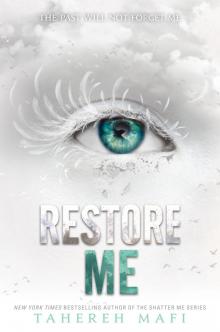 Restore Me
Restore Me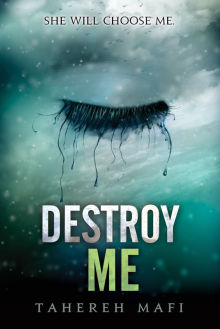 Destroy Me
Destroy Me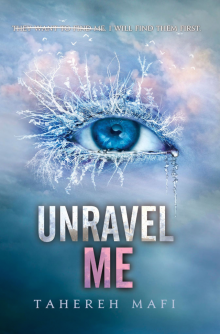 Unravel Me
Unravel Me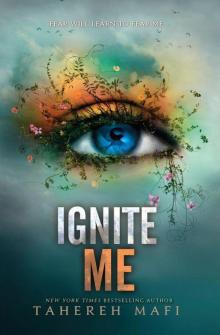 Ignite Me
Ignite Me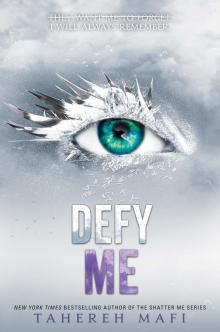 Defy Me
Defy Me Fracture Me
Fracture Me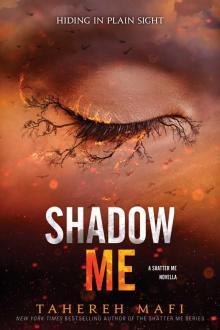 Shadow Me
Shadow Me Whichwood
Whichwood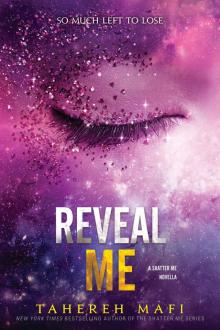 Reveal Me
Reveal Me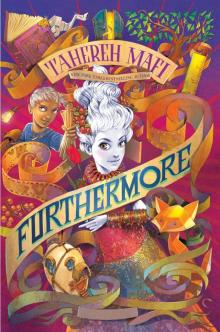 Furthermore
Furthermore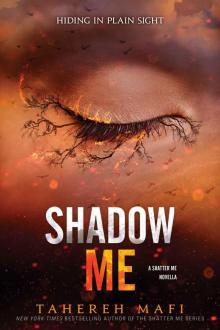 Shadow Me (Shatter Me Novella)
Shadow Me (Shatter Me Novella)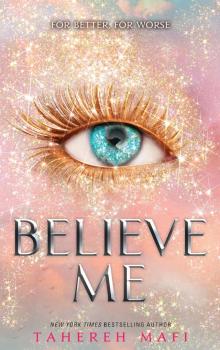 Believe Me
Believe Me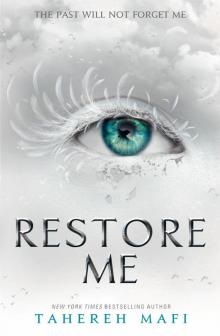 Restore Me (Shatter Me)
Restore Me (Shatter Me)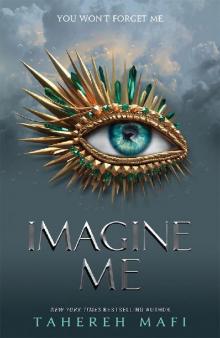 Imagine Me
Imagine Me An Emotion of Great Delight
An Emotion of Great Delight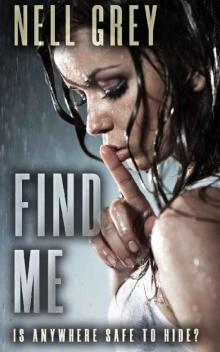 Find Me
Find Me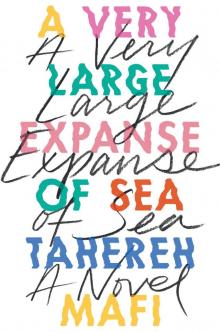 A Very Large Expanse of Sea
A Very Large Expanse of Sea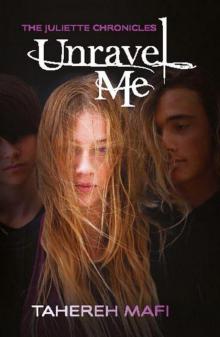 Unravel Me: The Juliette Chronicles Book 2
Unravel Me: The Juliette Chronicles Book 2